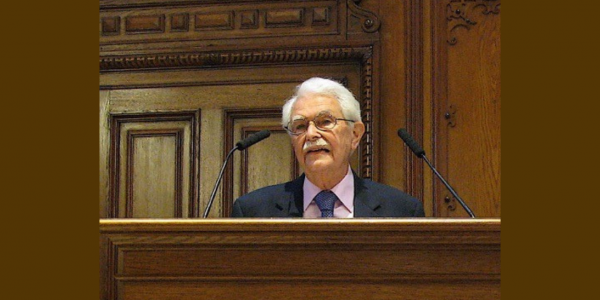Half a century ago, Egon Schwarz and Guy Stern were organizing in a systematic manner a new field of literary research: that of exile literature of the 1930s and 1940s.
In both cases this interest had its roots in their experiences as refugees from Austria and Germany. In 1938, Egon Schwarz fled as a young Jewish man of 16, together with his parents from Vienna to Prague, and from there to France and to Latin America. Under the most horrific circumstances they escaped from a racist regime that left – with the Holocaust and a world war – Europe in ruins. Exile and banishment had a deep impact on Egon Schwarz’ anti-racist, anti-war, and anti-authoritarian world view, and it formed his humanistic value judgments when dealing with literature in the social context. His books on Hofmannsthal, Rilke, Eichendorff, and on Jewish Viennese literature are proof of it. Washington University was lucky to recruit him in the early 1960s after he had studied at Ohio State University and the University of Washington, and after serving as instructor and assistant professor at Harvard University. Liselotte Dieckmann, a refugee from Germany as well, hired him.
During the late 1960s and early 1970s he chaired the German Department and was able to expand the graduate program. Together with his colleagues David Bronsen and Peter Uwe Hohendahl he started to arrange international and interdisciplinary conferences, and the first one, in 1972, was on exile literature. The proceedings of this symposium had a lasting impact on further research in this field, both in the US and in Europe. A few years later he published his autobiography about the ten years in Latin American exile. This book has literary qualities and reads like a picaresque novel; no wonder that it has been translated by Philip Boehm, one of the very best translators from German into American English; and no wonder that it appeared in three editions and is still on the market.
Egon Schwarz was not the inhabitant of an ivory tower but saw to it that the results of his studies reached broader audiences beyond the confines of the university. He liked to publish essays and reviews in the Frankfurter Allgemeine Zeitung, and he enjoyed giving interviews to newspapers. In that regard he continued a tradition of faculty members in the Department: Otto Heller, founder of the German Department in the late 1890s and founding Dean of the Graduate School of Arts & Sciences in the 1920s, had been a regular contributor to the St. Louis Post Dispatch at a time when it was one of the best daily papers in the country. Over time, Egon Schwarz received many honors: he became the Rosa May Distinguished University Professor in the Humanities at Washington University in 1976, was elected a member of the German Academy of Language and Literature in 1986, received an honorary doctoral degree both from the University of Vienna and from Washington University, as well as the Cotta Prize for Literary Criticism in Stuttgart, and he had visiting appointments in the US, Germany, and New Zealand. A few years ago Marcel Lepper saw to it that the Egon Schwarz papers are housed now in the exile literature section of the German Literary Archives in Marbach.
His students and colleagues remember him as one of the most humorous, funny, ironic, laconic, melancholic, hospitable, supportive, and inspiring persons they have ever met. Egon Schwarz suddenly died on February 11, 2017 in St. Louis. In his other life he is probably fulfilling one of his many wishes he had for the future: to watch again the movies of his favorite actor/director Charlie Chaplin.





